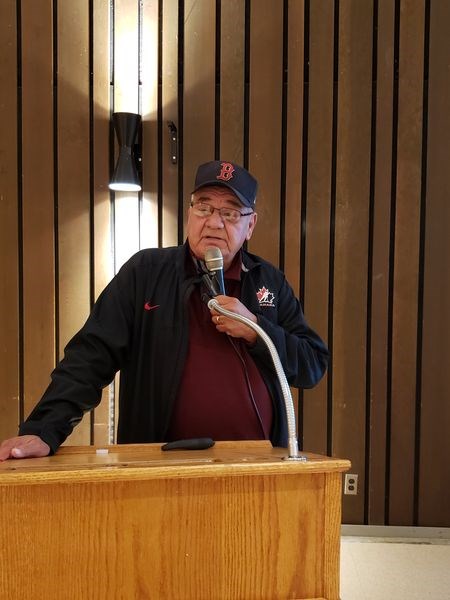The Yorkton Tribal Council (YTC) recently sponsored a Regional Opioid Gathering at the Kamsack OCC Hall.
On September 26, members of the Cote, Keeseekoose and The Key First Nations (FNs), including Chiefs and councillors, attended what was day two of the event, with day one С����Ƶ held at the Keeseekoose Chief’s Education Centre (KCEC) on September 25.
Day two at the OCC Hall began with a Pipe Ceremony by Albert Musqua, who also said the opening prayer. Registration was taken on-site and participants were entered for a number of door prizes.
The prime organizer and emcee for the program was Ivan Cote, director of health with YTC health and social development, and he acknowledged the youth in attendance “who are the future.”
Seven information tables were set up for all to visit and acquire pamphlets and useful items to take home, including T-shirts, mini-backpacks, re-useable plastic cutlery for travelling, travel mugs and more.
At his table, Burton O’Soup, a mental health therapist with YTC mental health was offering information about mental health, self-esteem, confidence and raising awareness; YTC Safe Haven was represented by Nola Mahingen (director of Safe Haven), Twyla Cote (family violence outreach worker) and April Brazeau (family violence outreach worker); YTC health with the aboriginal diabetes initiative, Canada prenatal nutrition program and Brighter Futures program was represented by Kelsey Naphouthai (Brighter Futures dietician), Alexa Mariano (health nurse educator) and Kristen Schott (chronic disease dietician); YTC’s addictions program, represented by Melanie Knutson (addictions worker) and David Keshane (youth outreach worker); YTC health and social development, represented by Patricia Lawson (mental wellness team co-ordinator) and Spencer Strongquill, (FASD (Fetal Alcohol Spectrum Disorders) co-ordinator); YTC Tribal Justice Unit, represented by Penny RockThunder (caseworker), Kelly Carrier (justice facilitator) and Mike Keshane (justice co-ordinator), and the New Beginnings Outreach Centre, represented by Liberty Whitehawk (cook), Jamie Desjarlais (mental health) and Rhonda Whitehawk (peer mentor).
Cote greeted the approximately 125 attendees and welcomed everyone to the second day of the Regional Opioid Gathering. He introduced Tyrone Keshane who performed an original song he had written.
Morley Watson, first vice chief of the FSIN (Federation of Sovereign Indigenous Nations), was introduced as the first speaker and he included a personal presentation of his past memories of his youth and his connections to Cote and Keeseekoose FNs and the team sports he participated in.
“If we can work together, we can face these challenges presented by the opioid crisis. We can equate our efforts to working towards our goal of healing as a team,” Watson said.
Dr. Ibrahim Khan of Indigenous Services Canada, regional medical health officer, spoke to the group about all the supports that are available for those with addictions, including transportation, referring to that as С����Ƶ “one of the biggest issues facing those seeking assistance with addictions.
“We need more and more partnerships, more and more understanding,” he said. “In my day-to-day job I deal with a lot of infectious diseases. In the Kamsack area I see a lot of partnerships С����Ƶ formed, I see intelligence and wisdom. We need to have local understanding to deal with the opioid crisis and crystal meth usage which is very addictive and inevitably leads to crime and violence because of it.”
Ted Quewezance, chair of the 20-bed Saulteaux Healing and Wellness facility at Cote FN spoke to those present in blunt terms. He said there has been a lot of misunderstanding about FN people, “but that reality will not hold our people back. We can accomplish whatever we put our minds to. We are dealing with serious issues and coming together to talk about solutions.
��“Let’s get real here,” he said with emphasis when he pointed out that there is a lack of resources to “heal our people.”
The underlying theme of the presentations was that the youth are the future and the youth need to know they have access to good support to achieve their future goals, free from addictions. Those in attendance included teachers and students from the FN schools.
Tim Ominika of Wikwemikong, near Sudbury, Ont., was in attendance and had been a presenter on day one at KCEC. His main message was the implementation of a “harm reduction approach as opposed to abstinence with opiates.”
Ominika is the Indigenous program director at the Northwood Recovery Treatment Clinic in Ontario. Servicing the FN communities, the clinic is referred to as a “wholistic model for FN communities that utilizes physicians and incorporates cultural and traditional, including outdoor, aspects into the healing process.”
Ominika was responsible for designing and implementing the program. Back in 2008, having seen a need in the community for treatment for opiate dependency, he understood that travel for those seeking treatment resulted in “a disconnect” between the individuals’ and their families.
“By having a wholistic treatment model, these individuals are reconnected with their families and communities,” he said. “I work directly with physicians in my position as a collaborator and communicator. I share information on a community level and it is the collaboration of services that makes this effort so successful.”
Since 2014, Ominika has worked directly with opiate replacement treatment clinics. He also serves his community as an elected councillor, currently in his third term.
The final presenter at the OCC Hall was Dr. Peter Butt of the College of Physicians and Surgeons in Saskatoon, and he was accompanied by Dr. Werner Oberholzer, the deputy director of the College who is responsible for setting the standards, policies and guidelines for physicians who administer the medications for addictions recovery. Dr. Butt gave his presentation on the wholistic approach to the recovery from addictions, which supports personal growth and development.
In addition to the draws for door prizes, the day included a lunch and snacks.
��
��




